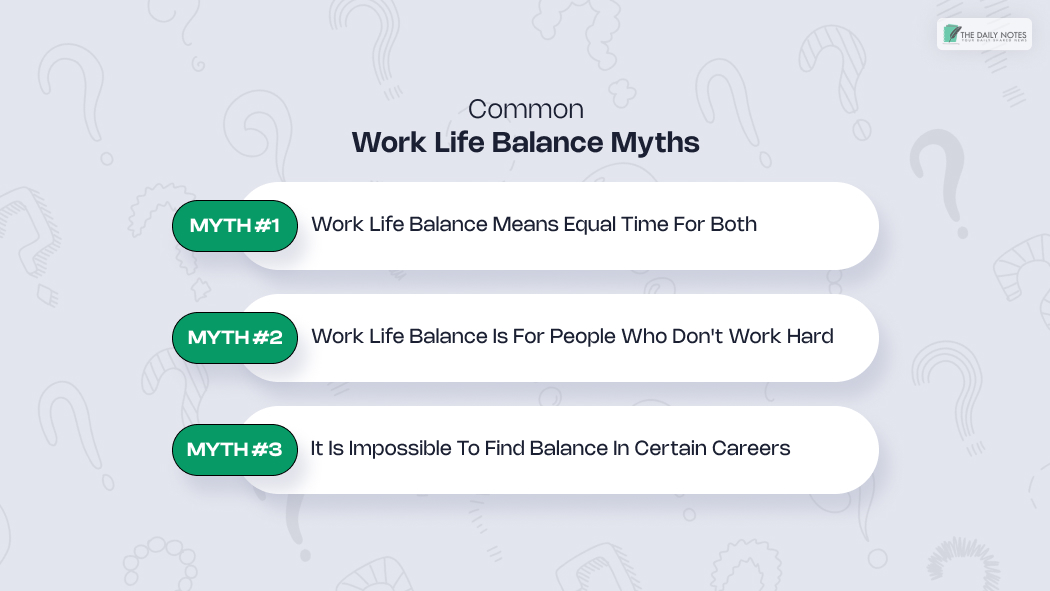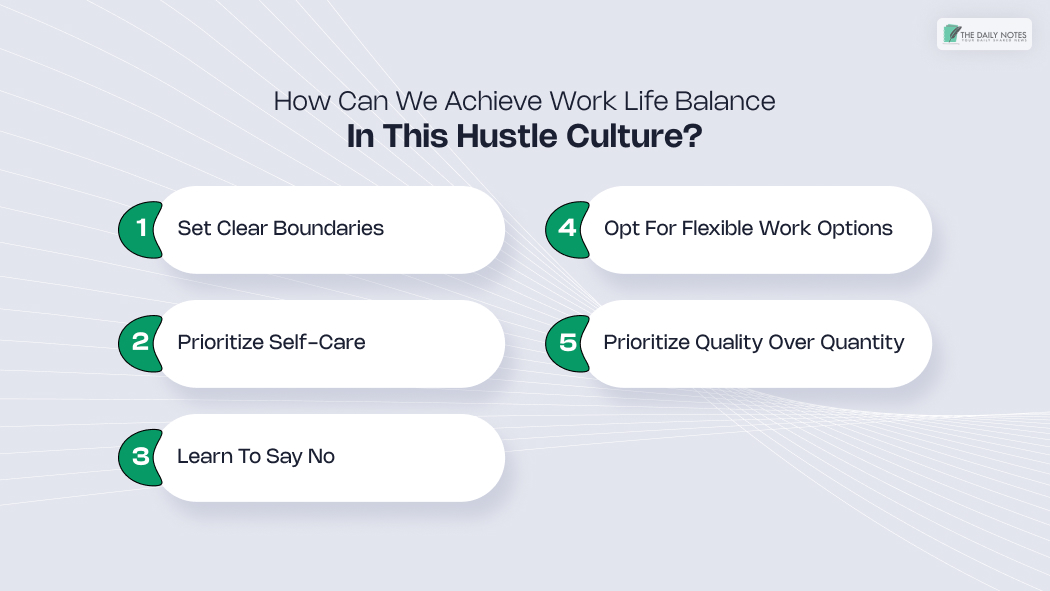In the fast-paced world that we live in today, productivity is glorified, and the hustle culture reigns supreme. Often making us wonder if the concept of work life balance is a myth or reality.
Is work life balance accurate in a world that praises working long hours, constant grind, and side hustles? At a time when corporate wellness is finding its ground.
It is easy to ask, is this the way to maintain harmony between professional requirements and personal well-being? We’ll answer similar questions in the following sections and help you strike a balance!
The following sections will explore the myths of work life balance, how hustle culture impacts the concept, and whether work life balance is a reality or a myth.
What is Work Life Balance?

Before diving into the myths of work life balance, it is essential to understand what it truly means. At its core work life balance implies a harmonious blend of professional and personal life. This is balancing work and career ambitions and taking responsibility for hobbies, health, and family.
Work-life balance is about ensuring that neither of the two overshadows the other allowing a well-rounded fulfillment. You may use productivity hacks for it or say a few ‘no’ that hurt some people.
Interestingly the definition of work life balance varies from person to person. For example, an individual may think leaving the office at 5:00 p.m. to spend time with family is a work-life balance.
Whereas for someone else, it might mean having the flexibility to work remotely while traveling.
Despite the variations, the goal is the same: maintaining a balance between work and life.
However, the rise of hustle culture has put this balance under pressure. Let’s see what it entails.
Hustle Culture: Our Antihero

Hustle culture relies on the idea that success only comes to those who work tirelessly at the expense of their personal life and health. It is a mindset that glorifies the grind, promoting working overtime and having multiple income streams through side hustles.
This antihero has pushed many to question whether work life balance is even attainable. After all, how can one maintain balance when constantly hustling to get ahead?
Can work-life balance coexist within an environment that celebrates workaholics? In an ideal work environment, that shouldn’t be the case.
Common Work Life Balance Myths

There are several everyday myths of work-life balance that perpetuate the idea that achieving a perfect balance is either impossible or not to chase it. Let’s see bunk of you such myths:
Myth #1: “Work-life Balance Means Equal Time for Both.”
One of the biggest myths about work-life balance is that you need to spend equal time on your personal life and work to achieve a balance. That’s not the case; balance does not mean 50 50 splits.
It’s all about prioritizing what matters the most at different stages of your life. Some weeks, work might demand more time, while other weeks, personal life takes precedence.
From mastering the art of first-time management to chasing the targets, it all involves prioritization.
Myth #2: “Work-life Balance is for People Who Don’t Work Hard.”
Hustle culture often promotes the idea that people who strive for work-life balance, lack ambition or don’t want to work hard. However, that’s not the truth.
Many highly successful individuals prioritize work life balance to avoid burnout and maintain long-term productivity that sustains their overall well-being.
Myth #3: “It is Impossible to Find Balance in Certain Careers.”
Some industries, such as finance or law, have reputations for demanding long hours, but that does not mean that work-life balance is impossible there.
Achieving a balance looks different depending on the career, but it is possible to maintain personal time even in demanding roles with the right strategies and boundaries.
These are some of the common myths that often discourage people from trying to strike a balance. This leads to burnout, fatigue, and dissatisfaction. Henceforth, what is the truth? Is it a myth or reality?
In some companies, there are employee resource groups that take care of individuals facing this issue by providing them with the necessary support.
Is Work Life Balance Just a Myth?

One of the most critical questions in the modern work environment is if work life balance is impossible. On the surface, it may seem so, especially in industries and cultures that prioritize working late, juggling side hustles, and multitasking.
The blurred lines between professional and personal life, thanks to technology, make it seem as though work never truly ends.
However, this perspective overlooks the fact that work life balance isn’t a one-size-fits-all solution. While it may be challenging to achieve a perfect balance, it is not impossible. The key to achieving this is personal boundaries, understanding your needs, and flexibility.
The notion that work-life balance is a myth largely stems from unrealistic expectations or a misunderstanding of what balance looks like.
For some, balance may mean working long hours for a few months, followed by time off. For others, it could involve integrating work into life so seamlessly that they can enjoy both simultaneously. Think of it like attending a work call while walking in the park.
In this aspect, work life balance can be customized to fit individual lifestyles.
Why is Work Life Balance Such a Big Deal?

Work life balance may seem like a myth for some, but it has become a necessity for others. Since the pandemic, mental health and well-being have been paramount, especially in the corporate sector.
Employees began thinking about their work-life priorities and the rise in resignations after the pandemic, where workers left toxic work environments that did not value balance and personal well-being.
As a result, more organizations are sensitized towards this, which allows them to rethink their culture.
Due to this, there have been introductions such as remote work, flexible schedules, and mental health support for employees, proving that balance is possible. It is essential and achievable.
Let’s look at the reasons why work life balance is crucial in today’s workforce:
Prevents Burnout
Without work-life balance, employees are more likely to experience burnout, which can lead to decreased productivity, high absenteeism, and long-term health problems. When employees are given the time to recharge, they return to work feeling more focused and motivated.
Increases Job Satisfaction
When employees feel they have the flexibility to manage both professional and personal lives, they are more likely to report higher job satisfaction. When work does not infringe on individual life, employees are happier and are more likely to stay in the organization due to increased engagement.
Improves Mental and Physical Health
Overworking can cause stress in individuals, leading to a host of mental and physical issues. From anxiety and depression to high blood pressure and heart diseases, there are reports of such problems developing due to chronic stress in corporate employees.
A balanced approach to working in life can help minimize these risks, leading to a healthier, more resilient workforce.
Enhances Relationships
Work life balance isn’t just about reducing stress. It is about having the time to cultivate meaningful relationships. Beat with family, friends, or partners without the time, personal relationships can suffer, which leads to feelings of dissatisfaction and isolation.
When you prioritize a balance between your work and personal life, you ensure that your relationships are well maintained.
Let’s look at the steps to achieve a work-life balance in this hustle culture.
How can We Achieve Work Life Balance in this Hustle Culture?

While hustle culture may tell you that working 24/7 is the key to success, finding balance is essential to achieving long-term well-being and fulfillment. So, how do you navigate hustle culture while maintaining a sense of balance? Let’s find out:
Set Clear Boundaries
Setting clear boundaries is essential for maintaining balance. This could mean not answering emails after work hours get over or designating specific hours for work and personal life.
You must also communicate these boundaries to your employer or clients to ensure they are respected.
Prioritize Self-Care
You should incorporate self-care into your routine through meditation, exercises, or hobbies. It can be anything that brings you joy. Self-care allows you to recharge and maintain both your physical and mental health, essential for maintaining balance.
Learn to Say No
Many people fall into the trap of overcoming meetings to stay productive. Learning to say no to meetings, additional responsibilities, or projects can help you manage your time more effectively, which ensures that you do not overwhelm yourself.
Opt for Flexible Work Options
Take advantage if your company offers flexible work arrangements like remote work or flexible hours. These options help you control your schedule better, creating a better balance between your personal life and work.
Prioritize Quality Over Quantity
Getting caught up in the number of hours you work is easy, but hustle culture tends to overlook the importance of quality. That is usually the case; however, that’s common.
You must focus on being productive and efficient during your work hours rather than just putting in long hours for the sake of it.
Work Life Balance – Myth Or Reality?
Now that you know all you know, would you say work-life balance is just a myth, or can it be a reality in today’s hustle-driven culture?
The truth is there needs to be a balance. While achieving perfect balance every day may be unrealistic, striving for it long term is not impossible. You must think of your well-being and overall health.
The key is understanding what balance looks like for you, putting a conscious effort into prioritizing yourself, caring about said boundaries, and managing your time effectively.
Hustle culture can promote the idea that work is essential in life, but more people recognize that a fulfilling life requires more than just professional success.
When you reject the common work life valence myth and embrace a more holistic approach to your professional and personal well-being, it is possible to find harmony.
You May Like Also:




























